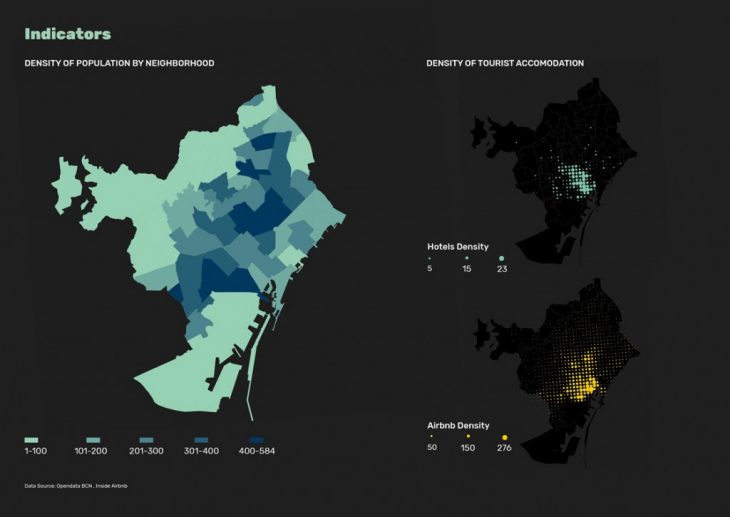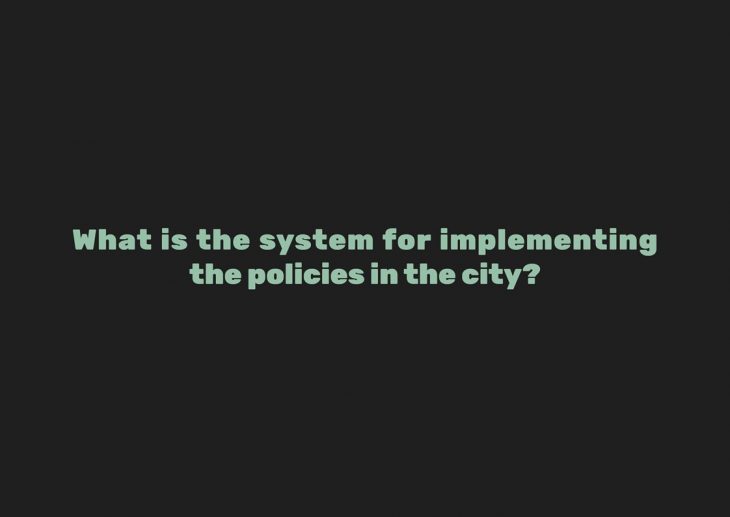Cities are constantly evolving through the interaction of people and the built environment, and data analytics becomes necessary to develop and enhance them. With the rise of Airbnb and the shift towards digital platforms, tomorrow’s economy will be reshaped. Airbnb has inverted a new economic model transforming the traditional one. Analyzing the data from InsideAirbnb will help understand the different patterns behind this sharing platform in 4 different cities, and try to improve the system and economic inequalities and policies in Barcelona.
INTRODUCTION
Crowd-Based Capitalism.
Going back in time, the economic system of the 18th century was a market-based economy, shifting to managerial capitalism in the 20th century, where products and goods were distributed by a firm, a traditional hierarchical organization. Whereas today, in the 21st century, digital technologies are transforming the economy, with the evolution of capitalism, called crowd-based capitalism where the sharing economy evolved out of the digital revolution and became an alternative model to the previous one, with the main focus being the crowd.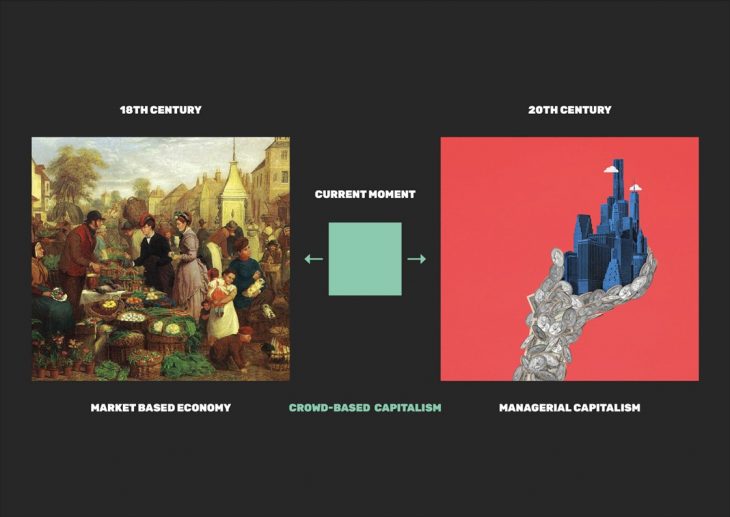
Two-sided Market.
The crowd-based capitalism is transforming business economics, leading to higher economic growth and more variety in products and services, simultaneously, it has disrupted the way the world’s economy operates.
The business model from an economy-sharing perspective represents a two-sided market, a business model facilitating direct interaction between two different groups through an intermediary being the platform.
Such platforms are operating in different sectors, such as uber in the transportation sector, and Airbnb in the housing sector.
As a sharing economy, Airbnb was a new hybrid business model, with the initial purpose being the activation of underutilized assets by a peer-to-peer interchange. This platform was supposed to respond to the demand of travelers who wanted to “live like a local; live in a local’s home; eat like a local”. With time it was also providing alternative accommodation in cities.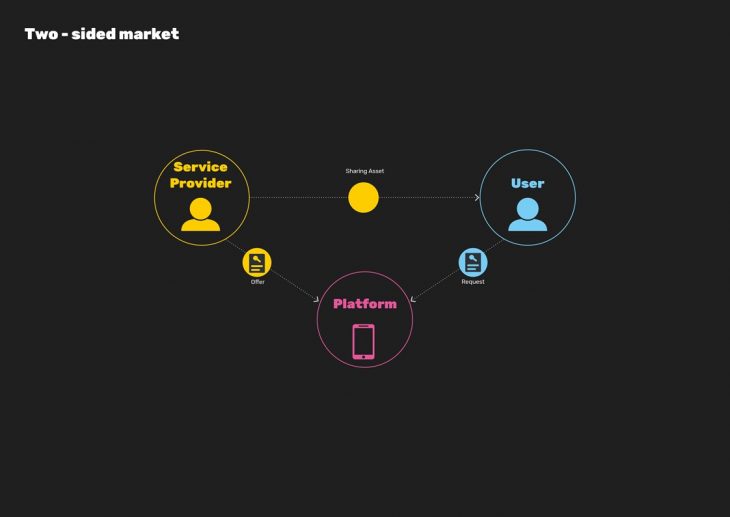
BENCHMARK
Going back to how we started, we analyzed the Airbnb datasets for 5 cities from InsideAirbnb and were able to grasp a pattern out of it.
We noticed that in all the different cities, there are a few hosts that have multiple listings on the platform, going up to 200 and 300 listings.
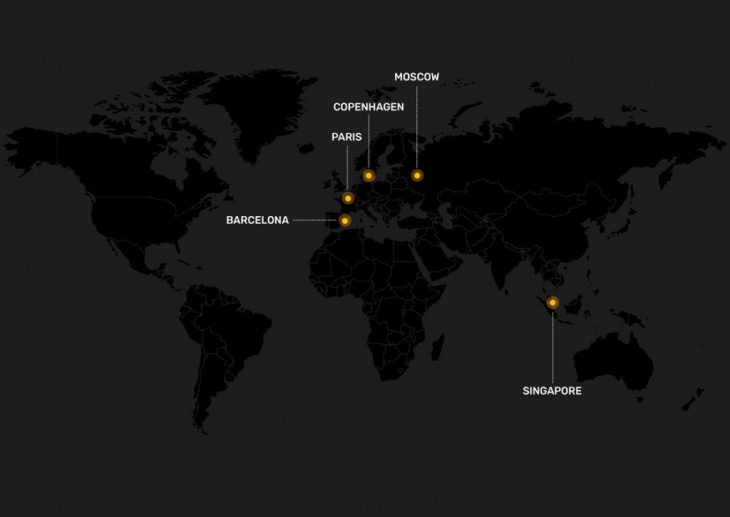 Airbnb as a sharing platform in the era of digitalization has an impact on the cities we live in. The taxonomy developed for the analysis behind this platform:
Airbnb as a sharing platform in the era of digitalization has an impact on the cities we live in. The taxonomy developed for the analysis behind this platform:
– Individual host: one apartment a local person part of the sharing economy.
– Multi-list host: more than one apartment agencies doing business out of this platform.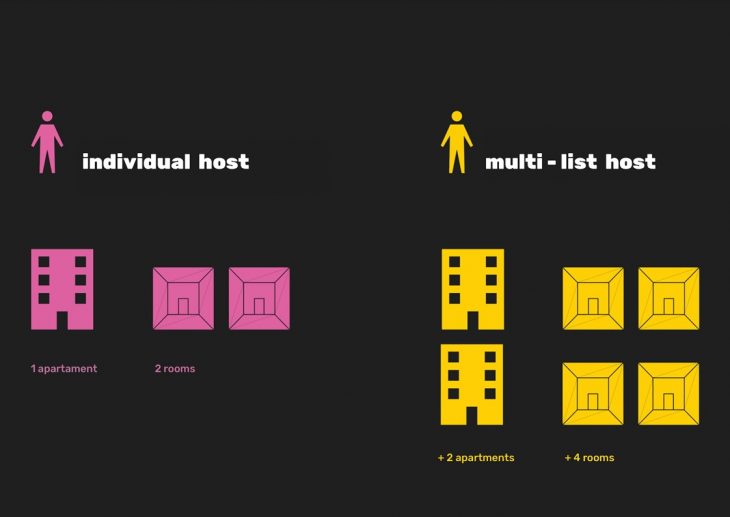
This taxonomy will allow differentiation between locals trying to be part of the sharing economy, versus agencies that are operating in the same platform. Based on the taxonomy, the focus on the data analysis will be to understand the corporations hijacking the sharing economy and the economic inequalities for benchmark cities, by the different pattern of the data showing different policies put in place. To later be able to propose a new policy for this disruptive technology.
Barcelona.
Being one of the most touristic cities in the world, with a ratio of 1/19 of locals over tourists. The platform of Airbnb is taking over the city, with hosts listing entire apartments, and private rooms. By analyzing Airbnb Data from InsideAirbnb, we noticed an interesting point, most hosts have several listings (the example of one host having 173 listings), this shows how corporations are hijacking the sharing economy platform.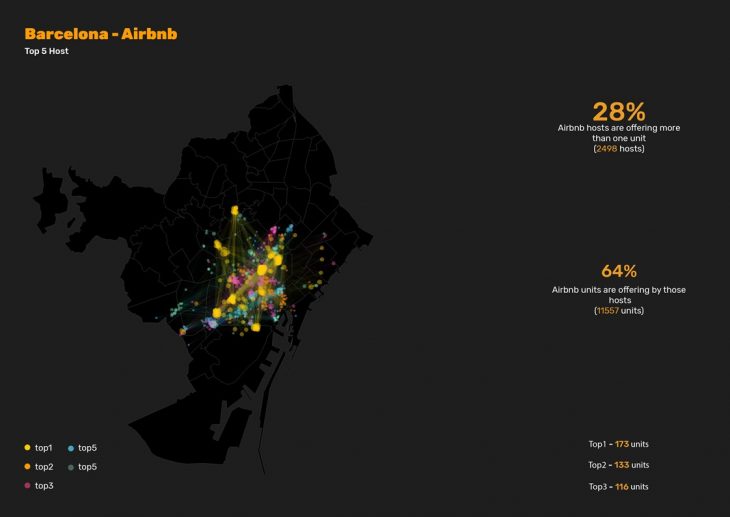 With the analysis of the data from 2015 to 2019, the business market is taking over this platform with 70% of the listings by multi-list host.
With the analysis of the data from 2015 to 2019, the business market is taking over this platform with 70% of the listings by multi-list host. 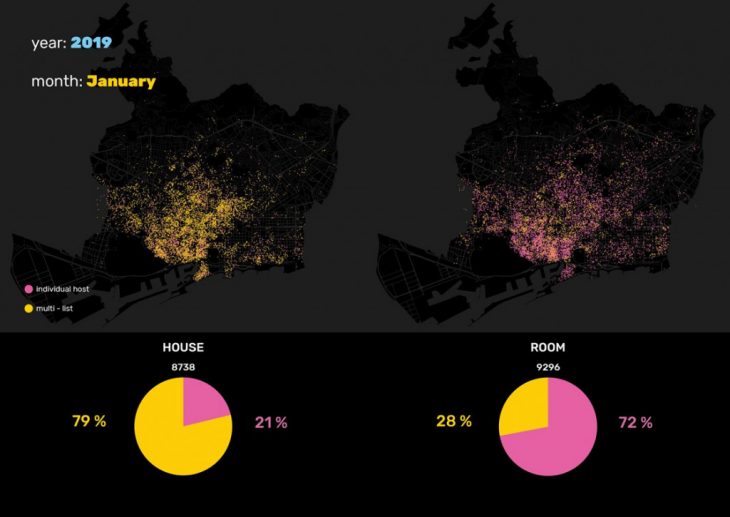 Explaining this number, the policies implemented by the government are not tackling this point. The city has mainly tried to limit the Airbnb effect with licensing schemes on rentals in the old town but had never tried to deal with the corporations hijacking sharing economy, concentrated in the hands of large corporations.
Explaining this number, the policies implemented by the government are not tackling this point. The city has mainly tried to limit the Airbnb effect with licensing schemes on rentals in the old town but had never tried to deal with the corporations hijacking sharing economy, concentrated in the hands of large corporations.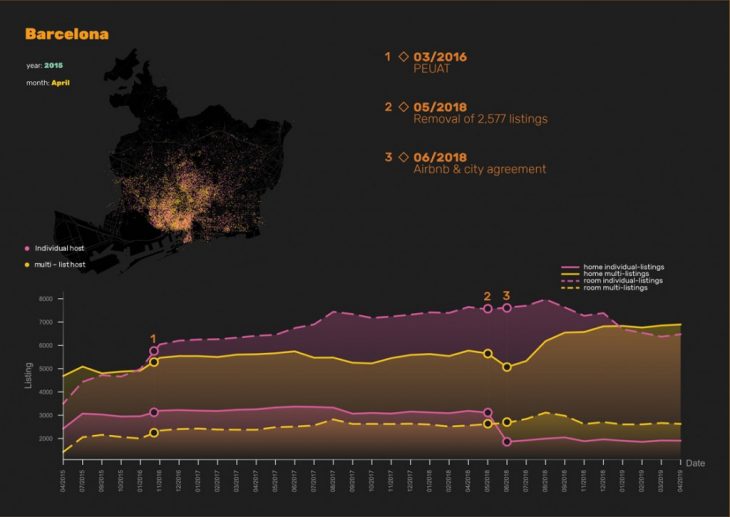
Singapore.
In the case of Singapore, 74% of the listings are for multi-list host.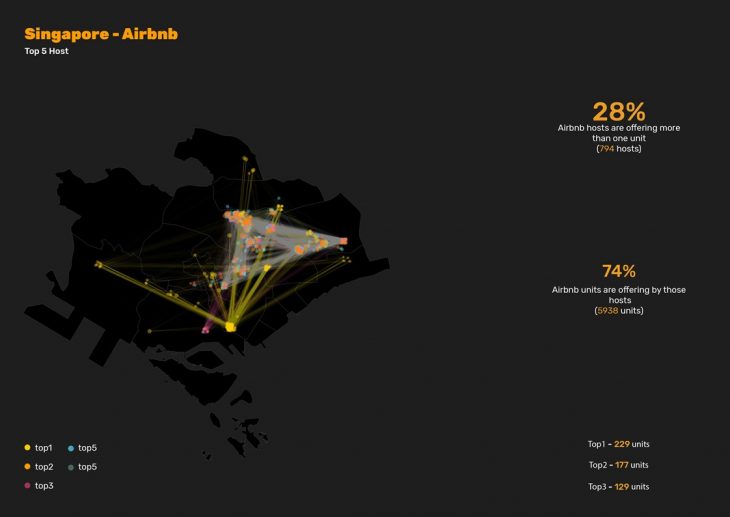 With Singapore being one of the most dense and populated areas, how is this digital platform delt with?
With Singapore being one of the most dense and populated areas, how is this digital platform delt with?
Multi-list hosts are the main active users in Airbnb. 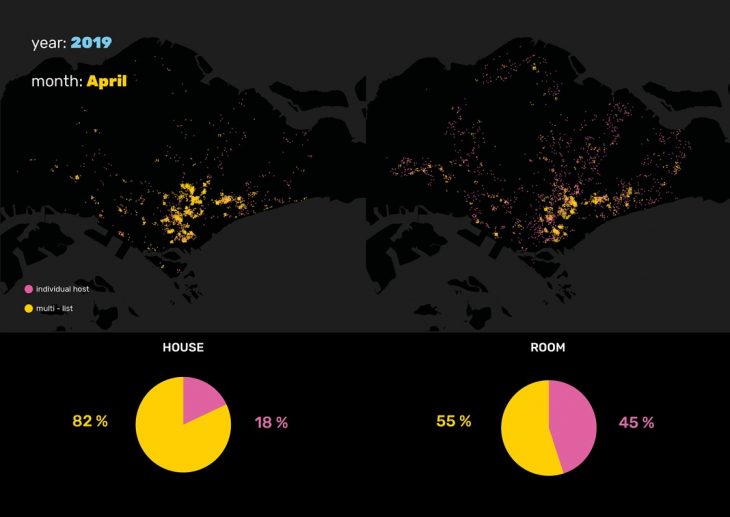
By understanding the policy by the government, we can explain this number. In fact, residents cannot rent out their properties for less than 3 months, in this case, Airbnb becomes a platform not focused on tourists but on visitors that stay for a longer period, which is mainly beneficial for the corporations who want to make a business out of this platform.
Such strict rules make the city-state one of the tougher markets in which Airbnb operates, the city is trying to safeguard the interests of its citizens, with Singapore being one of the most dense and populated areas.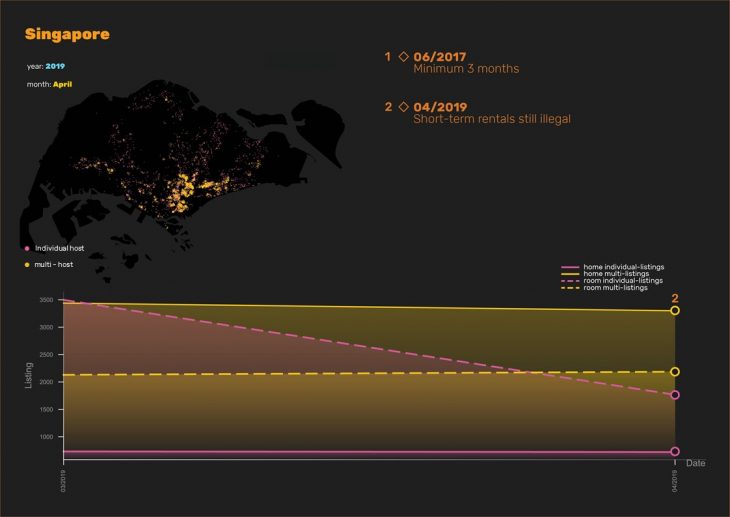
Paris.
In the case of Paris, we notice a shift from the active users of the Airbnb platform with only 21% of the listings by multi-list host. 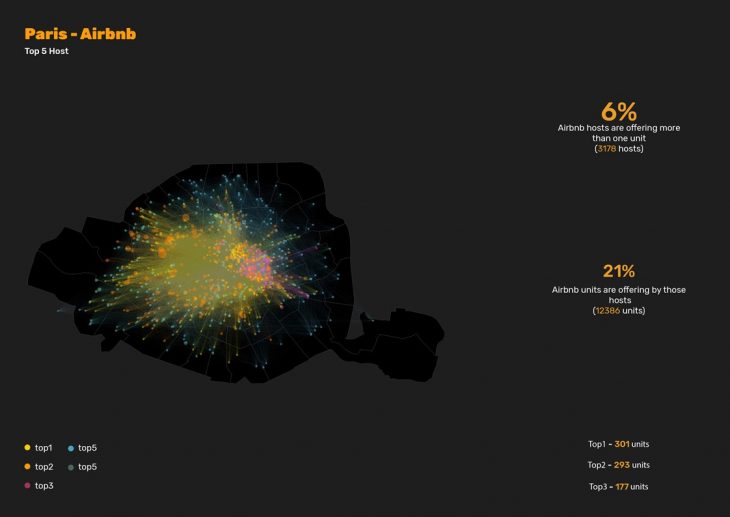 Throughout the years, the percentage of the listings by multi-list hosts is diminishing, with the locals being the active hosts of this platform.
Throughout the years, the percentage of the listings by multi-list hosts is diminishing, with the locals being the active hosts of this platform. 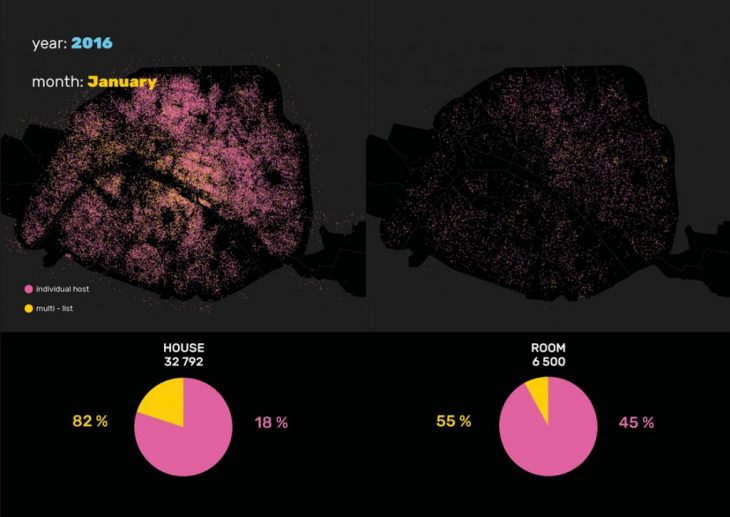 In the case of Paris, the government is fighting to keep Parisians in the center and not let tourists eat up their space, so they implemented policies with regulations. Since 2017, all apartments listings should be registered in the city hall, A tourist tax was implemented as well as a 120-Day rental limit in most neighborhoods in Paris. This explains why only 20% of the listings are for multi-list host.
In the case of Paris, the government is fighting to keep Parisians in the center and not let tourists eat up their space, so they implemented policies with regulations. Since 2017, all apartments listings should be registered in the city hall, A tourist tax was implemented as well as a 120-Day rental limit in most neighborhoods in Paris. This explains why only 20% of the listings are for multi-list host.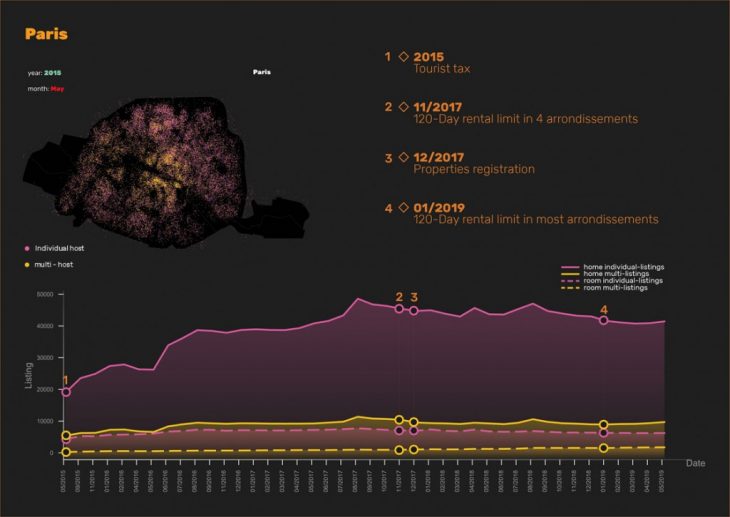
Copenhagen.
For the case of Airbnb in Copenhagen, the active users of the Airbnb platform are the individual hots, representing the local community.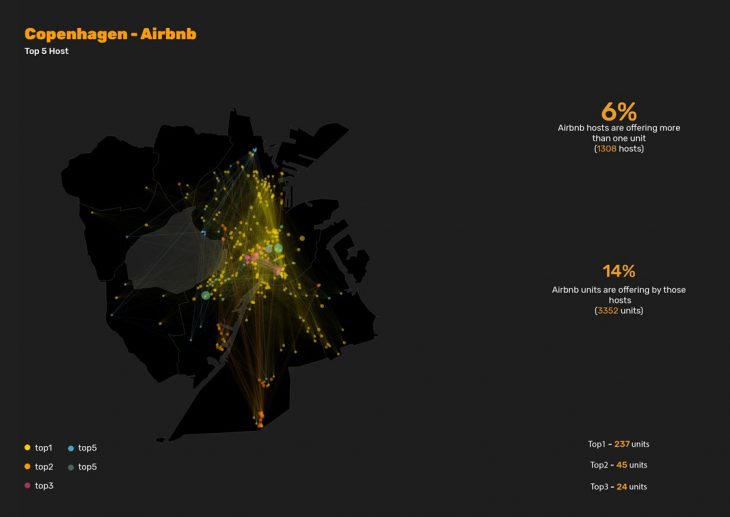 Moreover, analyzing more the increase of apartments and rooms, the listings by actual hosts is the dominant; with an average of 13% business listings only throughout the years.
Moreover, analyzing more the increase of apartments and rooms, the listings by actual hosts is the dominant; with an average of 13% business listings only throughout the years.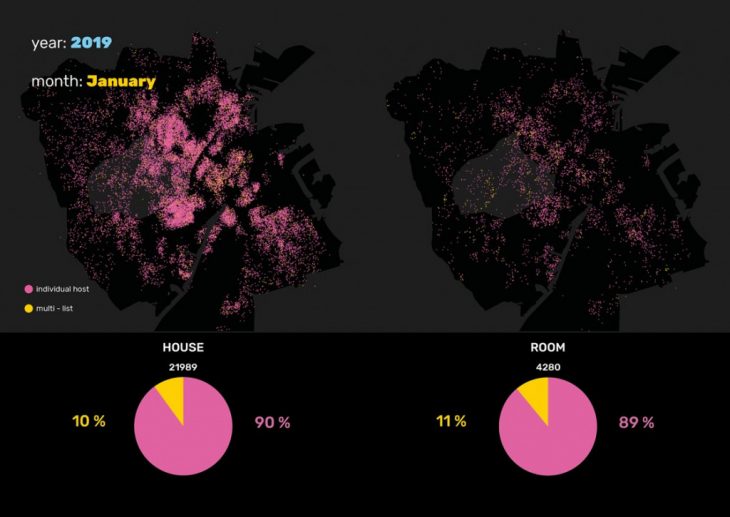 We can understand this difference by the regulations put in place by the city in 2016: ‘tax on airbnb earnings’ and ‘the number of nights a host can rent out his apartments should be a maximum of 100days/year’ which is not beneficial for the corporations who want to make a business out of this platform.
We can understand this difference by the regulations put in place by the city in 2016: ‘tax on airbnb earnings’ and ‘the number of nights a host can rent out his apartments should be a maximum of 100days/year’ which is not beneficial for the corporations who want to make a business out of this platform.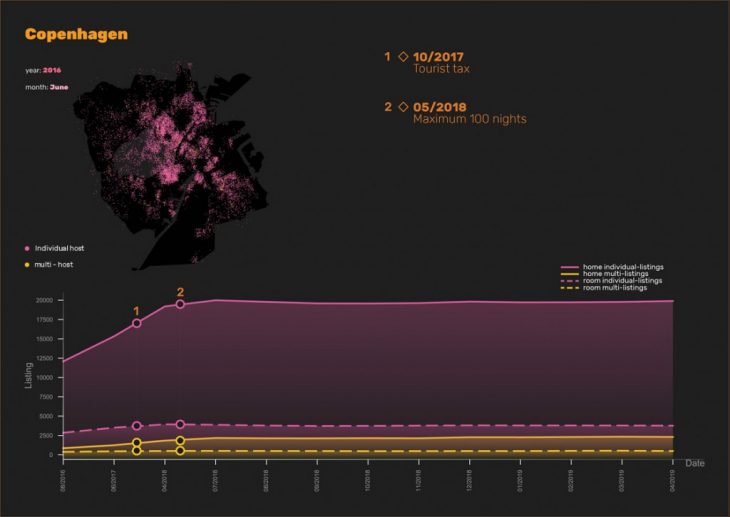
INTERVENTION
Policies.
“ The city as a monitor, meaning the city monitors the development of sharing practices and initiatives to decide how to intervene. The city as a regulator, meaning the city sets and adapts its rules. The city as a promoter, meaning the city intervenes directly by promoting sharing services and providing spaces, and indirectly by designing infrastructure, services, and incentives for sharing economy activities. The city as a collaborator, meaning the city partners with platforms or organizations to deliver new services to the citizens.”
-Sharing Cities, 2018
Based on the role that the city can play, 4 policies are proposed.
4 policies.
1-Setting up a policy for a free city where everybody has the right to share. The current tourist accommodation license ( that in most cases are owned by agencies and hotels) is removed. The license is a right you have, and it can not become a commodity.
This brings everyone the opportunity to be part of the sharing economy.
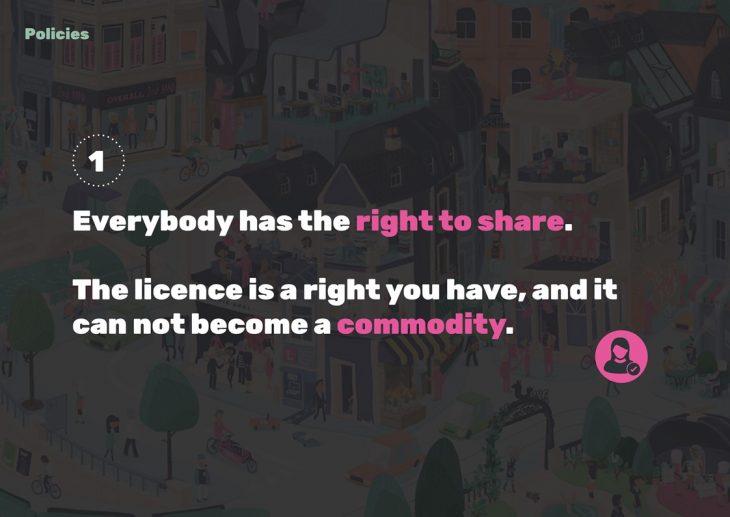 2-This means that each time the host wants to share their apartment/room, they have to check if they meet the conditions to be able to have access to the market and operate with their license.
2-This means that each time the host wants to share their apartment/room, they have to check if they meet the conditions to be able to have access to the market and operate with their license.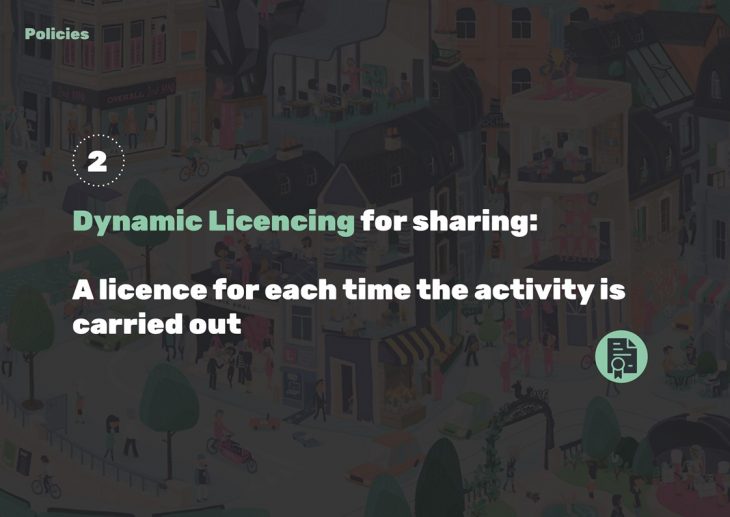 3-There is a margin for operation days and units. the host can rent out the apartment for a maximum of 120 days, with a limit of 2 apartment registered. There are no limits for rooms.
3-There is a margin for operation days and units. the host can rent out the apartment for a maximum of 120 days, with a limit of 2 apartment registered. There are no limits for rooms.
This type of regulation has been adopted in several cities including Paris & Copenhagen.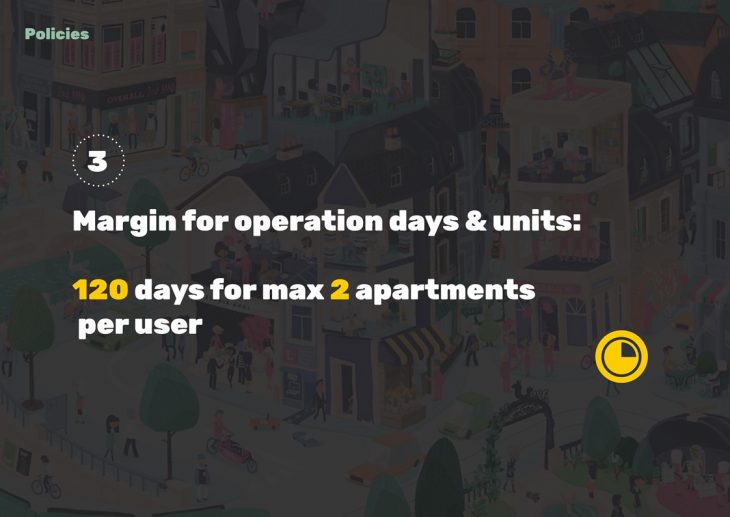 4-Platforms like Airbnb enable considering the city as a hotel, with dynamic rooms.
4-Platforms like Airbnb enable considering the city as a hotel, with dynamic rooms.
As hotels have specific capacity to host, the city should also determine a capacity to be considered “tolerable” to be able to provide a good service for the tourist while conserving the rights of locals.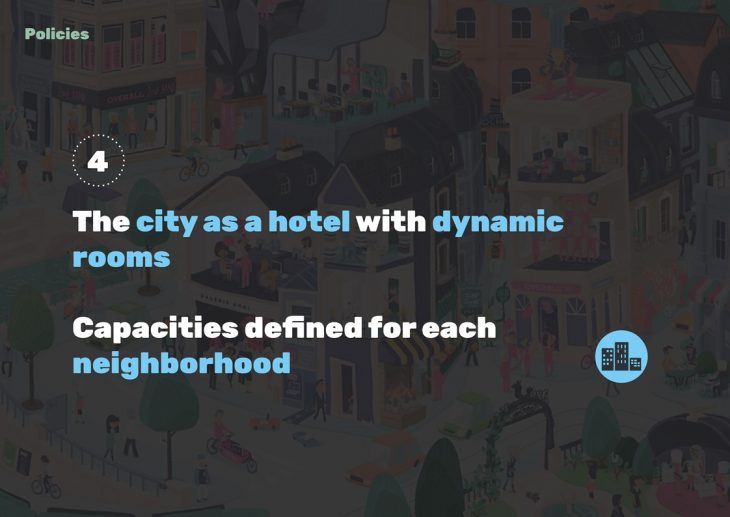
Indicators.
The capacities are defined for each neighborhood, and can be set based on 2 indicators:
A definite number is not introduced, but some indicators are suggested to be taken into account for determining the capacity density of population, density of tourist accommodation (comparing the overnight of locals to tourists
System.
When it comes to comparing governance & policies to markets, there are three main points:
1. The policies and governance operate on a different scale. While markets (specifical ones like Airbnb have one global scale)
2. Markets adapt quickly to change while policies take more time.
3. There are more steps included in following the regulation process, while the registration process in digital platforms requires much fewer steps.
The city needs a system that enables it to have the policies operate in a digital format (dynamic licensing), and also have real-time integrated information of the users and activities to be able to increase the adaptability of the policies by consisting of spatial data infrastructure. The operating system helps to bridge the gap between private businesses, the public sector, and individuals.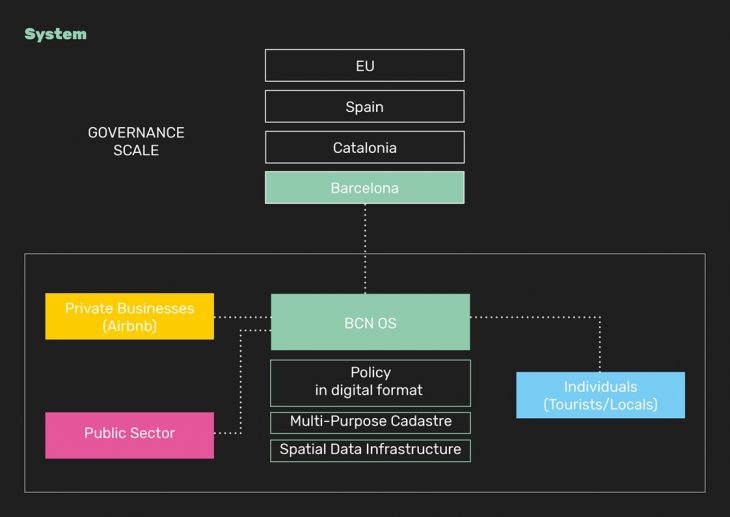
Multi-purpose cadastre.
The cadastre is a tool that has existed for so many years, however, it has the capacity of being used in other segments as well. This enables integrated information in one platform, enabling new administration services. “Civilized living in market economies is not simply due to greater prosperity but to the order that formalized property rights bring” (De Soto, 1993). New information technology forms the new role of the cadastral systems: the multipurpose cadastre. The cadastre system helps to have a unique identifier for each apartment. This number acts as the key to the profile which consists of general information such as the owner, land use, etc.
People should use this number for signing up for Airbnb to be a host. This new process of registration avoids multi-host to register more than the limited amount.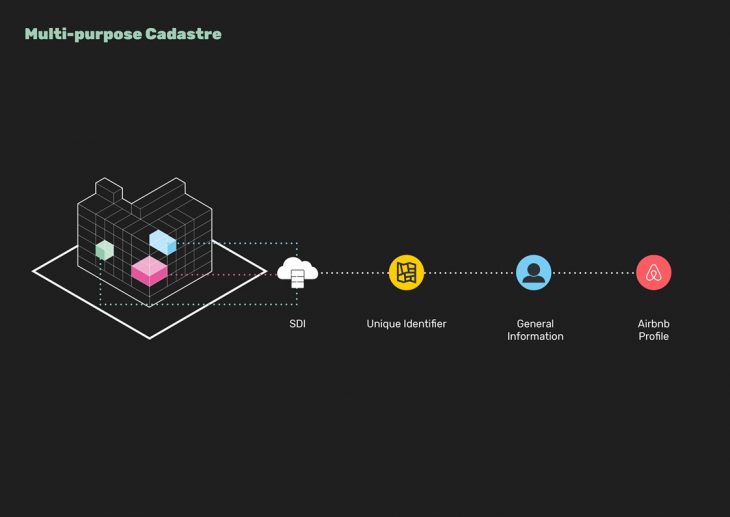
Dynamic Licence Portal.
Another part of the OS is the portal that manages the dynamic licensing operation, in which every Airbnb is registered. The portal receives the requests and applies the condition rules ( the days, units, and neighborhood capacity limits) and allows access to market-based on them.
Since a license is issued for each time the host wants to rent their home, the city has the data of all the sharing units in its system.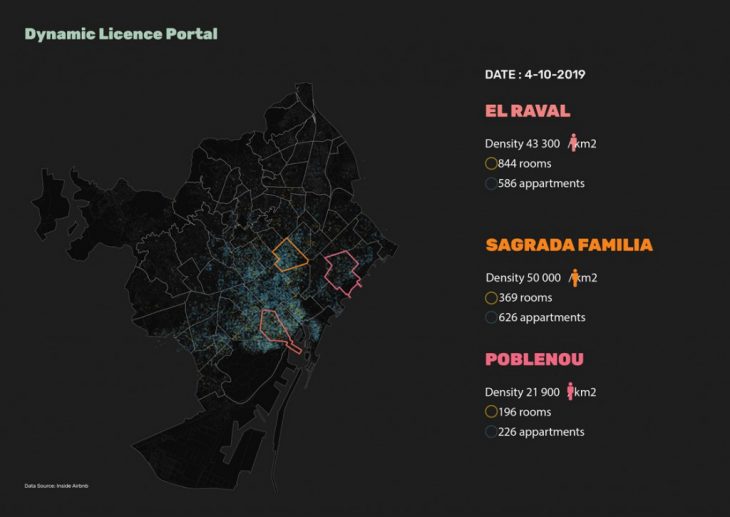
New operation model.
The City OS becomes the 4th element in the new operation model of Airbnb ( a two-sided market platform).As the City OS provides service for the platform, 1.5 % of the platform’s revenue goes to the city for the operation management of the system.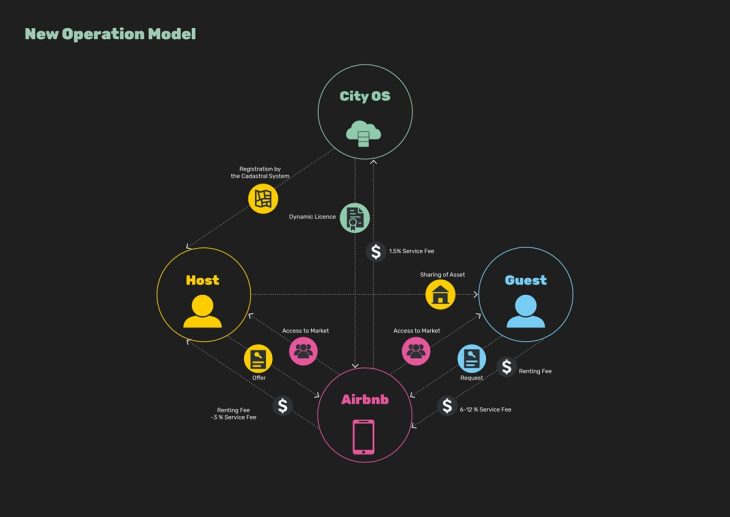
CONCLUSION.
The policies and the operating system enables supporting local people to perform easier in these platforms and Provides the city with a tool to better manage tourism and sharing services.
Capitalism in a sharing city is a project of IaaC, Institute for Advanced Architecture of Catalonia
developed at Master in City & Technology in (2018/2019) by:
Students: Natali Barada , Maria Uporova , Mahsa Nikoufar , Luyang Zhang
Faculties: Luis Falcon, Diego Pajarito

